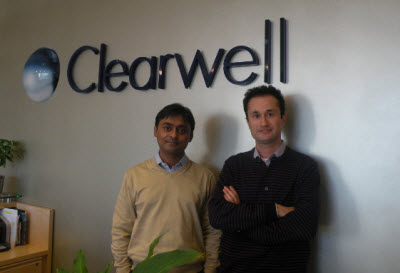
The Mountain View, Calif.-based company first launched its service in 2006, but now has released its fifth version and is hiring a bunch of engineers to expand its offerings. Clearwell plans to expand from 100 employees to more than 200 in the coming year.
[aditude-amp id="flyingcarpet" targeting='{"env":"staging","page_type":"article","post_id":143605,"post_type":"story","post_chan":"none","tags":null,"ai":false,"category":"none","all_categories":"business,","session":"A"}']The company’s 350 clients are a who’s who of corporate America, including Viacom, Dow Jones, Fedex, Boeing, General Electric, Coca Cola, Microsoft and Hewlett-Packard. The company is profitable and has tripled its revenues this year. That’s an indicator of substantial growth, as is a recent survey of legal discovery customers. It showed that 81 percent of respondents said they expect e-discovery requests to increase in 2010. And some 73 percent plan on bringing their e-discovery process in-house.
AI Weekly
The must-read newsletter for AI and Big Data industry written by Khari Johnson, Kyle Wiggers, and Seth Colaner.
Included with VentureBeat Insider and VentureBeat VIP memberships.
The product is used by thousands of lawyers and information security specialists. Its importance has increased in recent years as email has become more and more pervasive in documenting the processes that happen within enterprises.
“There is a written record for almost everything that happens in a company now,” Aeref Hilaly, chief executive, said in an interview. “In addition, some landmark court cases require companies to produce records upon request. Big document searches are now a normal course of business.”
The company started with an idea in 2005. Venkat Rangan and Bill Korn founded the company, and Hilaly and Kamal Shah came on to run the business. They launched it as a service, which resembles the business model of pioneers like Salesforce.com.
One recent customer had to search through the records of multiple agencies, going through 1.2 terabytes of data contained in 10.2 million documents. That’s typical of the types of searches that occur these days.
“We are doing to e-discovery what Google did to the Yellow Pages,” Hilaly said.
[aditude-amp id="medium1" targeting='{"env":"staging","page_type":"article","post_id":143605,"post_type":"story","post_chan":"none","tags":null,"ai":false,"category":"none","all_categories":"business,","session":"A"}']
Clearwell knows that companies are getting their money’s worth out of its product. But it doesn’t know what kinds of searches are taking place. That’s because it hands over the technology to its customers and they do their own searching.
If the legal teams could do a single search and find what they wanted, Clearwell’s business wouldn’t exist. A variety of search engines can do the same thing. But Clearwell provides a legally backed-up process. A team will filter data again and again, tag it, export it, produce it in the right format, and document every step. Search is just one component. The challenge is to eliminate false positive results without having to read every single document.
“We call it transparent search, where it’s clear to you why documents are eliminated,” Shah said.
Even in cases that are settled, such as the big Intel-Advanced Micro Devices antitrust case, electronic discovery has a big and ongoing role. And courts are more keen to get at the truth. They’re not willing to accept the excuse that a data search is “too expensive” or “hard to do.” For the ability to search through 100 gigabytes of data, Clearwell charges $65,000. That comes with service and support.
[aditude-amp id="medium2" targeting='{"env":"staging","page_type":"article","post_id":143605,"post_type":"story","post_chan":"none","tags":null,"ai":false,"category":"none","all_categories":"business,","session":"A"}']
The company has rivals, but none as focused as it is. Autonomy has a broad enterprise search product. Kroll Ontrack also has a document search product. A startup Kazeon was bought by EMC, and Metalincs was acquired by Seagate.
To date, the company has raised $33 million in three rounds from Sequoia Capital, Redpoint Ventures, and late-stage venture funds. Clearwell has no timeline for an initial public offering. Hilaly said the company’s goal is to quadruple sales in coming years.
Hilaly says the company is chronically understaffed. It is hiring engineers locally and is adding other business staff, such as sales and marketing, elsewhere. While the recession has hurt legal budgets, Clearwell is getting its share of legal expenses that companies are obliged to spend anyway.
“We just tell them to use us and spend less,” Hilaly said.
[aditude-amp id="medium3" targeting='{"env":"staging","page_type":"article","post_id":143605,"post_type":"story","post_chan":"none","tags":null,"ai":false,"category":"none","all_categories":"business,","session":"A"}']
VentureBeat's mission is to be a digital town square for technical decision-makers to gain knowledge about transformative enterprise technology and transact. Learn More
